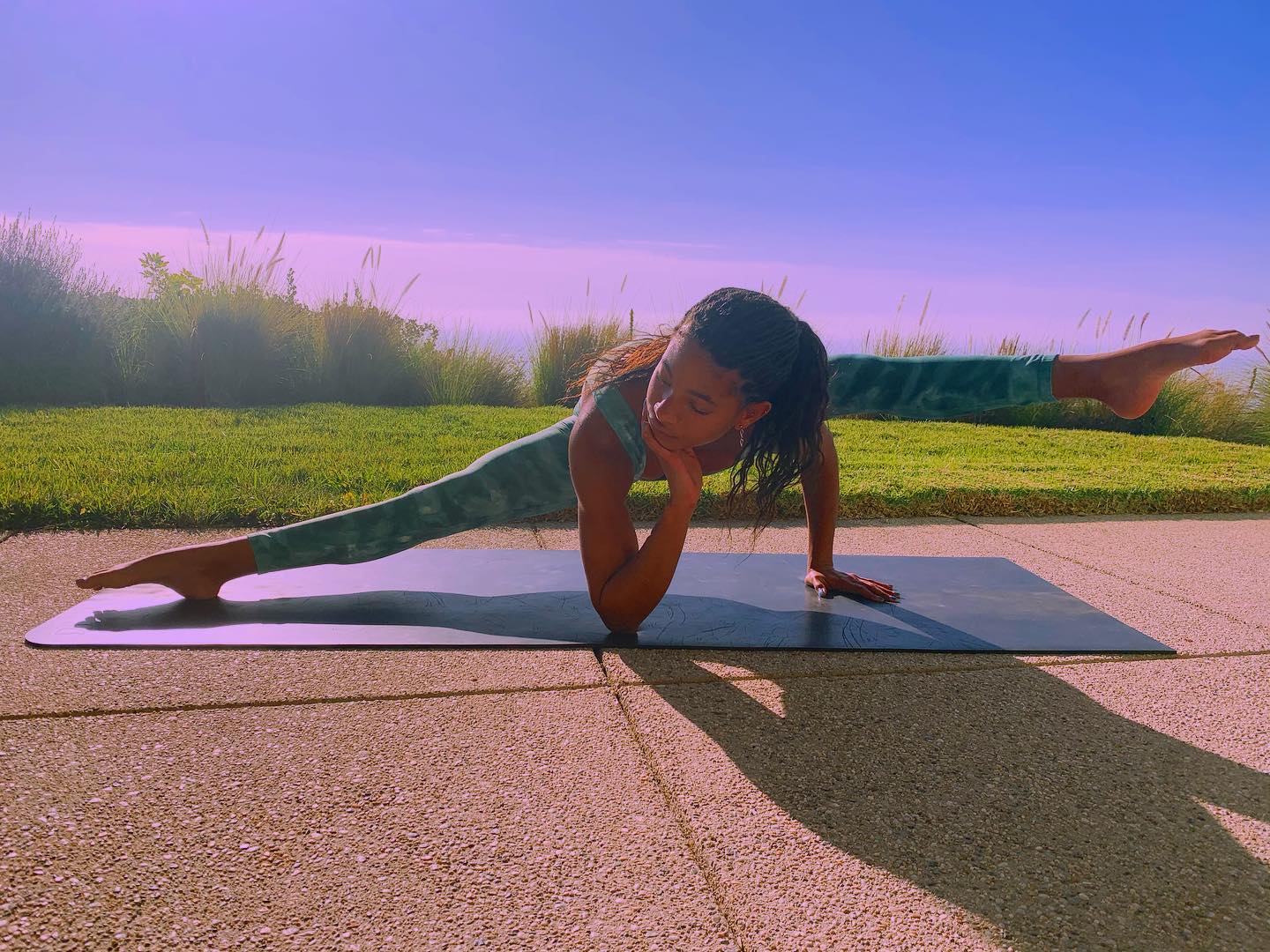We’ve seen Willow Smith grow up in front of our eyes. From her ‘blink, and you’ll miss it’ cameo in I Am Legend, to her whipping her hair back and forth by the school lockers, the 21-year-old musician has been a very busy rock star.
Nonetheless, thanks to being part of Hollywood royalty, thanks to her famous folks, Willow Smith has become adept at not only navigating life in the spotlight but also how to take a step back and prioritizing health and wellness.
“In the past, I defined wellness as being productive and getting things done, and that’s one side of it.
But I feel like the other side is actually knowing when you just need to stop, take a step back, and be like, ‘How do I really feel?’”
Speaking to VOGUE as part of their Well-Intentioned series, the Red Table Talk co-host delved into her wellness hacks and opened up about how she unwinds and relaxes her mind.
Willow Smith’s 5 Mindfulness Habits
1. Meditate, meditate, meditate

willowsmith/instagram
“I try to meditate longer and effectively for 10 minutes every day. Sometimes there’s the traditional sitting meditation, which, weirdly enough, I don’t do as often as I do chants, mantras, or listen to affirmations and repeat them.
The thing about meditation is your mind needs to be still. I feel like sometimes when we close our eyes, our mind just goes crazy. But I find that, when I open my eyes and focus on one specific thing, I can clear my mind more.”
Well, that’s one way to meditate.
Granted Willow Smith’s approach does sound interesting, but the great thing about meditation is that there are so many ways to do it. Moreover, no matter which method you choose, you can still reap the practice’s incredible benefits.
In fact, a review published in The American Journal of Cardiology found that after an average of 7.6 years, participants who had practiced Transcendental Meditation (TM) were 23% less likely to die of any cause during that period and 30% less likely to die of cardiovascular disease during the same period. During the follow-up period, the researchers also noted that the subjects were 49% less likely to die of cancer.
2. Stay active
If you really want to be mindful of your health, then you need to be doing your best to stay fit and active. For Willow Smith, this means putting on her running shoes as, for her, running has been incredibly cathartic. In addition to providing psychological relief, running can also be shown to improve your physical health by boosting your heart, muscle, and bone health.
In addition to running, Smith shares that she’s also a big fan of yoga and hiking – both of which can help the body in a number of ways.

willowsmith/instagram
3. The Mind in Mindfulness
“Something as simple as recognizing what’s going on in your mind and being honest about it, even if it’s just to yourself, is very, very important.”
There’s no mindfulness if you don’t mind what your mind consumers. For Smith, she’s making sure that her mind is consuming all the right things by reading mindful books like Tara Brach’sTrusting the Gold and Jay Shetty’s Think Like a Monk.
Additionally. Smith also shared that she clears her mind before going to sleep by burning palo santo. For those unaware, palo santo is a tree native to South America, and it’s been used for medicinal purposes as well as to clear away negative energy (think burning sage).
4. Let The Music Play
Music is good for the soul, and it’s no wonder that Willow Smith makes sure to listen to a whole album every Friday.
Now, you may not be planning on following in Willow Smith’s footsteps, but that doesn’t mean that you can enjoy a few tunes. Research has found various ways in which music can improve your health and wellness. For instance, one study found that music can improve blood flow to the brain.
Another study found that music helped to improve mood and alleviate stress in older adults suffering from memory loss. Additionally, music has also been found to alleviate symptoms of depression and even help one better manage pain.
5. Practice Gratitude
“There’s so many things to be grateful for even if you’re not feeling the best on that specific day.
Sometimes it’s not about feeling good all the time; sometimes you just need to hold on to those things that you’re grateful for and know that things are beautiful.”
In addition to being a humbling experience, practicing gratitude can also be great for your health. Studies have found that practicing gratitude can improve your sleep, your mental health, and even your immune system.

selena gomez/instagram
Want to know more?
In taking care of herself, Willow Smith has a timer on her phone that manages how much time she spends on social media.
She isn’t the only person conscious of her social media habits. In fact, Selena Gomez hasn’t been on social media in over 4 years, all in an effort to preserve her mental health.
MAIN IMAGE CREDIT: willowsmith/instagram
References
Evers, Sophia & Dannert, J & Rödding, D & Rötter, G & Ringelstein, E.. (1999). The cerebral haemodynamics of music perception. A transcranial Doppler sonography study. Brain : a journal of neurology. 122 ( Pt 1). 75-85.
Innes, K. E., Selfe, T. K., Khalsa, D. S., & Kandati, S. (2016). Effects of Meditation versus Music Listening on Perceived Stress, Mood, Sleep, and Quality of Life in Adults with Early Memory Loss: A Pilot Randomized Controlled Trial. Journal of Alzheimer’s disease : JAD, 52(4), 1277–1298. https://doi.org/10.3233/JAD-151106
Leubner, D., & Hinterberger, T. (2017). Reviewing the Effectiveness of Music Interventions in Treating Depression. Frontiers in psychology, 8, 1109. https://doi.org/10.3389/fpsyg.2017.01109
Lu, X., Thompson, W. F., Zhang, L., & Hu, L. (2019). Music Reduces Pain Unpleasantness: Evidence from an EEG Study. Journal of pain research, 12, 3331–3342. https://doi.org/10.2147/JPR.S212080
Schneider, R. H., Alexander, C. N., Staggers, F., Rainforth, M., Salerno, J. W., Hartz, A., Arndt, S., Barnes, V. A., & Nidich, S. I. (2005). Long-term effects of stress reduction on mortality in persons > or = 55 years of age with systemic hypertension. The American journal of cardiology, 95(9), 1060–1064. https://doi.org/10.1016/j.amjcard.2004.12.058
https://www.today.com/health/be-thankful-science-says-gratitude-good-your-health-t58256





![women [longevity live]](https://longevitylive.com/wp-content/uploads/2020/01/photo-of-women-walking-down-the-street-1116984-100x100.jpg)









